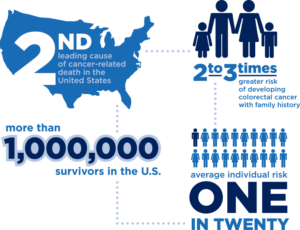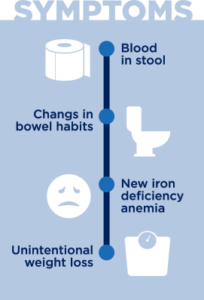In 2021, an estimated 149,500 people will be diagnosed with colorectal cancer. Are you in the know about the disease?
While colorectal cancer is among the most common types of cancer, it is also among the most preventable. Here are six other things you should know about the condition.
- Colorectal cancer affects both men and women. It’s not just a “man thing.” While the number of cases is slightly higher among men, colorectal cancer is almost as common among women. According to the American Cancer Society, about 71,000 men and 64,000 women are diagnosed with colorectal cancer each year.
- African Americans are most at risk for developing colorectal cancer. While the reason is unclear, African-American men and women develop the condition at a higher rate than any other racial group in the United States.
 In latter stages, colorectal cancer causes specific symptoms. While many cases of colorectal cancer are discovered during colorectal screenings — when they’re in early stages and have few symptoms — certain symptoms may indicate the presence of colorectal cancer. These symptoms include:
In latter stages, colorectal cancer causes specific symptoms. While many cases of colorectal cancer are discovered during colorectal screenings — when they’re in early stages and have few symptoms — certain symptoms may indicate the presence of colorectal cancer. These symptoms include:
- Changes in bowel habits lasting more than a few days
- Persistent feeling that a bowel movement is needed
- Rectal bleeding or blood in stool
- Cramping or abdominal pain
- Weakness or fatigue
- Unintended weight loss
If you experience any of these symptoms, talk with your physician to diagnose the underlying cause.
- Young adults may want to pay particular attention to the symptoms. While colorectal cancer has long been thought of as a disease affecting seniors, it’s becoming increasingly common among younger generations.
In fact, a recent study found that while overall rates of colorectal cancer have dropped in recent years, rates are rising among young adults. Millennials are at a particularly high risk.
Researchers aren’t yet certain why colorectal cancer is now being commonly found in younger people, but excess body weight, high consumption of processed meats and alcohol, sedentary lifestyles, and low fiber intake are all possible risks common among the group.
- There are some unchangeable risk factors for colorectal cancer. Certain risk factors, such as age, race and ethnicity, can’t be changed. Other unmodifiable risk factors include:
- A personal history of colorectal polyps or cancer
- A personal history of inflammatory bowel disease
- A family history of colorectal polyps or cancer
- Certain inherited syndromes, including familial adenomatous polyposis, Lynch syndrome, Gardner syndrome, Turcot syndrome, Peutz-Jeghers syndrome and MUTYH-associated polyposis
- Type 2 diabetes
- But colorectal cancer is largely preventable. The most important step to preventing colorectal cancer is to undergo regular, age-appropriate screenings for the condition. You can also lower your risk of developing colorectal cancer by:
-
- Eating a healthy diet — Fill your plate with fruits and vegetables, whole grains, fat-free or nonfat dairy, and lean proteins, such as chicken or fish. Limit your intake of red and processed meats, and avoid excess sodium and sugar.
- Exercising regularly — Aim for at least 150 minutes of moderate physical activity (such as brisk walking, water aerobics or doubles tennis) each week. Or fit in 75 minutes of vigorous exercise, such uphill hiking, singles tennis, circuit training or running. Mix up your workouts and include a blend of cardiovascular, strength training and balance exercises.
- Don’t smoke — While smoking and other tobacco use are most commonly linked with lung cancer, they are also linked with other cancers, including colorectal cancer. If you do smoke, speak with your physician about methods of smoking cessation.
- Limit alcohol consumption — Heavy alcohol use is a risk factor for colorectal cancer. Men should stick to no more than two drinks a day (12 ounces of regular beer or 5 ounces of wine), while women should have no more than one drink per day.
An annual checkup offers an opportunity to talk about your risk for developing certain conditions, including colorectal cancer. If you’re experiencing any symptoms of colorectal cancer or are at a high risk of developing the condition, talk with your doctor. He or she can recommend screening if appropriate. For more information, visit our website or call Erlanger Gastroenterology at 423-778-4830.







